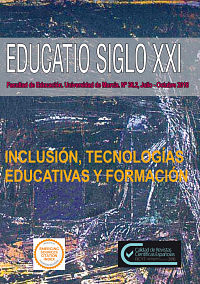Pedagogical innovation in teacher training supported by network videos
Abstract
The purpose of this contribution is toprovide an overview on the pedagogical
possibilities of social networking sites and
online videos for a paradigmatic change
in pre-service and in-service teacher trai-
ning. This work draws on both the results
of empirical research and theoretical
elaborations from current publications
on this subject. The methodology has an
eminently documentary nature, based
on international databases (ERIC, WOS,
SCOPUS). The findings show that it is in
the last five years when research and in-
novation projects are initiated—they aim
to explore, experiment and contrast the
benefits of these technologies in learning
and in their applications in the classroom.
Moreover, a growing interest in conceptual contributions concerning new teacher
training requirements to suit today’s so-
ciety is observed. However, there are still
few reflections on how social networking
sites and the inclusion of video in them
can contribute to the transformation of
current models and paradigms of teacher
training. The results obtained refer to: a)
the conceptualization of new challenges
that teacher training should assume in the
new digital environment and that should
be contemplated in the design of new tea-
cher training models, b) systematization
of lines and approaches research on the
pedagogical uses and formative functions
of videos in social networking sites in
teacher training; and c) identification of
the pedagogical potential of social net-
working sites and the inclusion of video:
open learning, communicative interaction,
agency of subjects and collaborative cons-
truction of knowledge. In conclusion, the-
se aspects are considered key to support a
new model of teacher training. But also, to
facilitate the construction of a new identi-
ty and professional teaching culture.
Downloads
-
Abstract783
-
PDF (Español (España))647
Original work publishes in this journal is subject to the following terms:
1. Murcia University Press (the publishing house) holds the copyright of the publishes work, and favours and allows their reutilization under the use license stated in point 2.
© Servicio de Publicaciones, Universidad de Murcia, 2015
2. Work is published in the electronic edition under a license (Creative Commons Reconocimiento-NoComercial-SinObraDerivada 4.0 España (legal text). They can be copied, used, disseminated, transmitted and publicly presented, as long as: i) authorship and original publication source is acknowledged (journal, publishing house and URL of the work); ii) are not used for commercial purposes; iii) the existence and specifications of this use license is stated.
3. Conditions for self-archive. Authors are allowed and encouraged to disseminate electronically the pre-pint (before review) and/or post-print (accepted for publication) versions of their work before their publication since that favours earlier circulation and dissemination resulting in an increased chance for the authors to be cited and for the work to reach a bigger share of the academic community. Colour: RoMEO: green.








